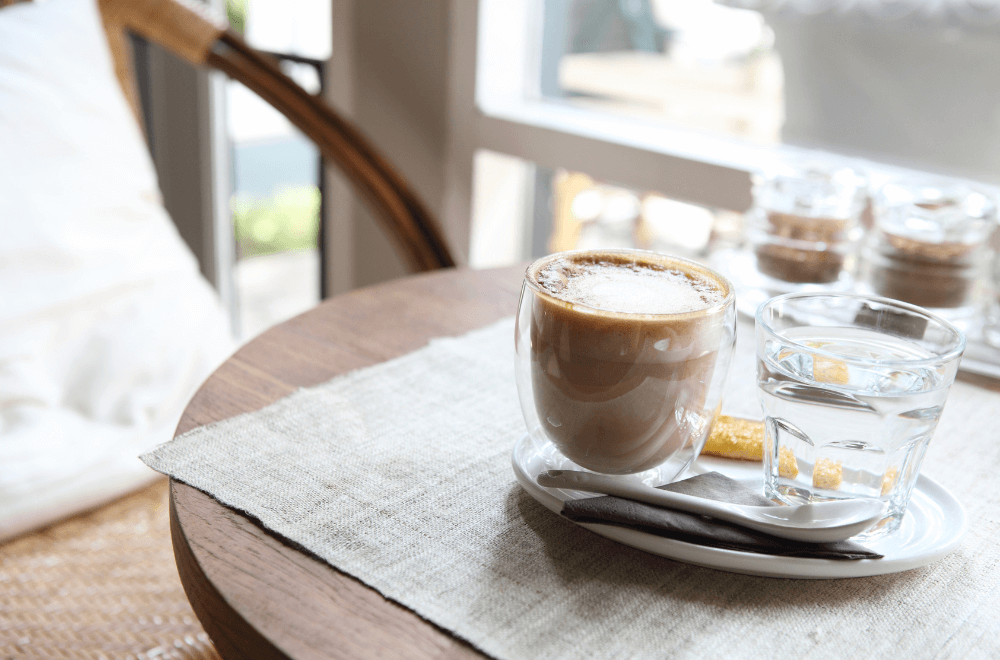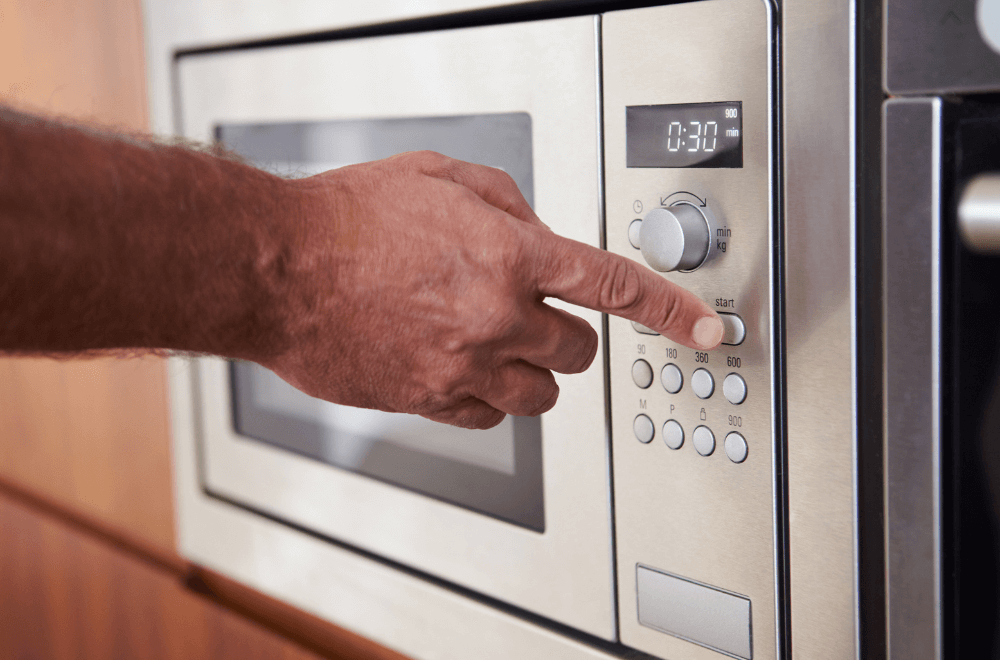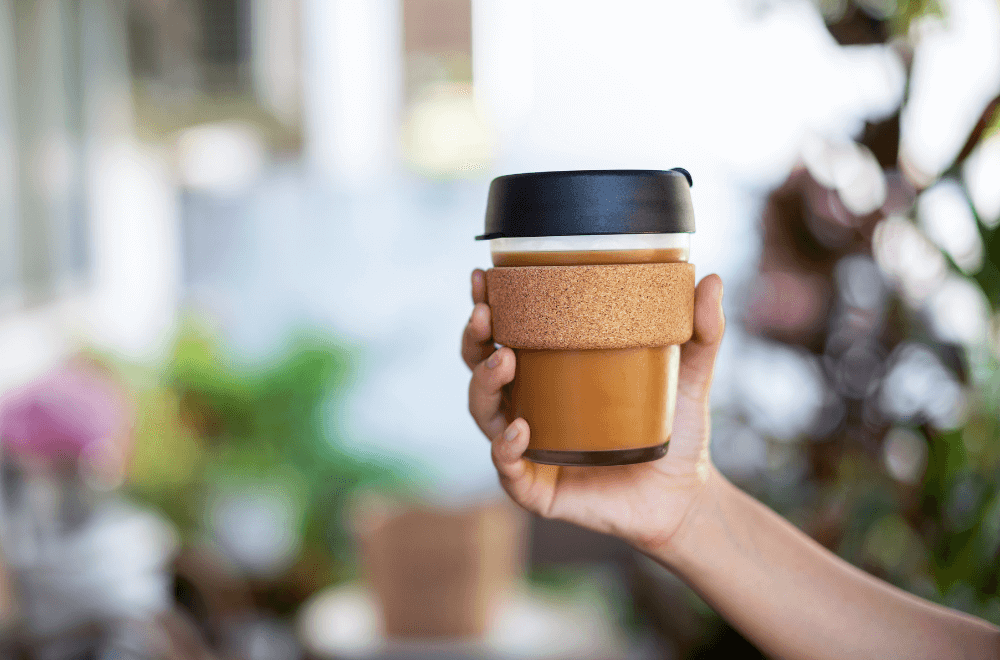You have to take a lot of precautions when heating glass kitchenware because it’s so fragile. So, are glass coffee mugs microwave-safe? Let’s learn more.

I love drinking coffee and tea from a glass coffee mug. Being able to see the layers of my cappuccino or get to watch the color seep from the tea bag is a wonderful way to begin my morning. I particularly like the glass mugs with a double wall, which can retain the heat of the coffee as a ceramic mug does.
However, I tend to get distracted in the morning with chores and getting ready for work. As a result, my coffee tends to get cold before I finish it, and I end up putting it in the microwave. Unfortunately, this is how I discovered that not all glassware is microwave-safe.
So, when it comes to determining are glass coffee mugs microwave safe, it depends. Many are, but if the mug does not have the microwavable symbol on the base or the original packaging, you can probably assume that it’s not.
Can Glass Go In The Microwave?
If you’re like me, you have microwaved glass containers many times before. From reheating leftovers in a glass Tupperware or melting butter in a Pyrex measuring cup for making cookies, I microwave glass fairly frequently without a problem.
That is why I was so surprised when my glass mug shattered in the microwave. In doing some research, I discovered two important facts about microwaving glass. The first is that there are different kinds of glass, some of which handle high temperatures better than others.
The second is that no kinds of glass like sudden temperature changes – which is why you also have to be careful when you put glass containers in the freezer. You might also find our explainer on how to heat up coffee without a microwave helpful.
What Types Are Glass Coffee Mugs Microwave-Safe?
Certain types of glass are more heat-resistant than others. Both tempered and Pyrex glass are designed to handle more extreme temperature changes than normal glass.
Pyrex is made with borosilicate glass. Borosilicate glass has a low coefficient of thermal expansion. This means that borosilicate glass is far less likely to break when exposed to extreme temperature changes compared to regular glass.
Cheaper glassware is often made with synthetic glass. These synthetic glasses typically do not handle temperature change well and will shatter in the microwave or in the freezer. Even just pouring hot coffee into a room-temperature synthetic glass coffee mug can be risky, as the temperature change can shock the glass.
It is also important to make sure that the glass coffee mug you wish to use does not have any plastic, rubber, or metal built into it. Some glass cups have rubber gaskets, such as a travel mug, or metal rims, such as a canning jar. These can melt or spark depending on the material.
Thus, it is important to make sure your glass cup is solely made from glass.
How Can I Tell If A Glass Coffee Mug Is Microwave-Safe?
When purchasing a glass coffee mug, you should first check the online listing or speak with the representative at the store to make sure the mug is microwave-safe. If the mug is made from tempered glass or Pyrex, then you can feel confident the mug is microwave-safe.
Further, many microwave-safe mugs will have a microwave symbol on the bottom. This is typically a simple image of a microwave with a series of squiggly lines. If you see this image on your glass cup, then it is safe to put it in the microwave.
Conversely, some glassware will have the microwave logo with an “X” over it. This logo indicates that the glassware is not microwave-safe.
What If I Don’t Know If My Glass Coffee Mug Is Microwave-Safe?

I have a few glass cups in my cabinet that I like, but they don’t seem to have a microwave-safe symbol on them. I was curious if there was a way to figure out if these glass cups are microwave-safe. I discovered there is a simple test to help determine if your glass coffee cup is safe to use in the microwave.
To begin, start with your glass coffee cup at room temperature. Fill it halfway with cold water from your sink. You are going to microwave this cup of water on high for 30 seconds to a minute.
After microwaving the cup of water, you will take the glass cup out and check the temperature of both the glass and the water. If the glass is as hot or hotter than the water, then the glass cup is not microwave-safe. If the glass is cooler than the water, then the glass cup is likely microwave-safe.
If the glass cup itself gets hot in the microwave, this indicates that the microwave is actually heating the cup itself. If left in the microwave for too long or used in the microwave too many times, then this kind of glass cup is likely to break. If the cup does not get hot in the microwave, this indicates it is made of heat-resistant glass that is able to withstand heat.
You can use this method to test any glassware. Essentially, if the glass itself has started to get hotter, this lets you know that if you microwave it for too long, the glass will break. However, this is just a simple test.
If you are unsure if a glass is microwave-safe, it is always best to exercise caution.
Choosing The Right Glass Coffee Cup
Now that we have figured out that not all glass is microwave-safe, we can figure out the best glass coffee mugs to add to our collection. There are a few general considerations.
Make Sure The Glass Is Heat-Resistant
First, as discussed, we want to make sure that the glass is heat-resistant. For example, the Bodum Bistro Coffee Mug [lasso ref=”amzn-bodum-bistro-coffee-mug-10-ounce-2-pack-clear” id=”54718″ link_id=”204738″] is made with borosilicate glass, so we know that it will be microwave-safe. These Libbey Robusta glass coffee mugs are made from soda-lime glass, which is not microwave-safe.
It is important to ensure the mug is made from the right kind of glass.
Choosing Single Or Double-Walled Cups
Second, unlike a ceramic mug, glass cups conduct heat very well. This means that the heat of your coffee beverage will heat the glass, both cooling your beverage and making the cup too hot to hold. That’s why many glass coffee mugs are made with a double wall of glass.
The two layers of glass better insulate the coffee, keeping your coffee nice and hot and the outside of the mug cool enough to touch comfortably.
It is important to also determine if a double-wall glass coffee mug is dishwasher safe. Because there are two layers of glass, if the cup is not made well, water can accumulate inside the two layers of glass, potentially leading to breaking. While this double-walled mug from Sweese is microwave-safe, it is not dishwasher-safe.
If you are looking to really elevate your coffee-drinking game, I recommend checking out the Fellow Stagg Tasting Glasses. These mugs combine microwave-safe glass with a sleek design that will fit in with just about any kitchen aesthetic.
Glass Coffee Mugs For Those On The Go

Not all of us have the luxury of drinking our coffee at home. Glassware can be difficult to take as we travel since glass tends to heat up quickly and leach the heat out of our beverage. Plus, the risk of dropping and accidentally breaking a glass cup is much higher when we are on the move.
A good glass travel mug has several important features. First, it must be made of tempered glass; that way, it is resilient to being dropped. As I mentioned before, tempered glass is also microwave-safe! As well, it will need a non-glass sleeve to protect your hands as the mug heats up.
Finally, you will need a good lid for sipping the coffee that prevents spilling.
The KeepCup Reusable Glass Coffee Cup is an excellent choice for anyone looking to buy a portable glass coffee mug. With a BPA-free plastic lid and cork sleeve, this mug is effective, stylish, and environmentally friendly. Just make sure to take the cork sleeve off before you put it in the dishwasher!
Invest In High-Quality Products
As glass mugs have become more trendy, more options have shown up on the market. It is best to choose your mugs from a reputable source that lists the actual kind of glass their mugs are made from. If a product listing does not say what kind of glass the mug is made from, it is likely made from synthetic material.
